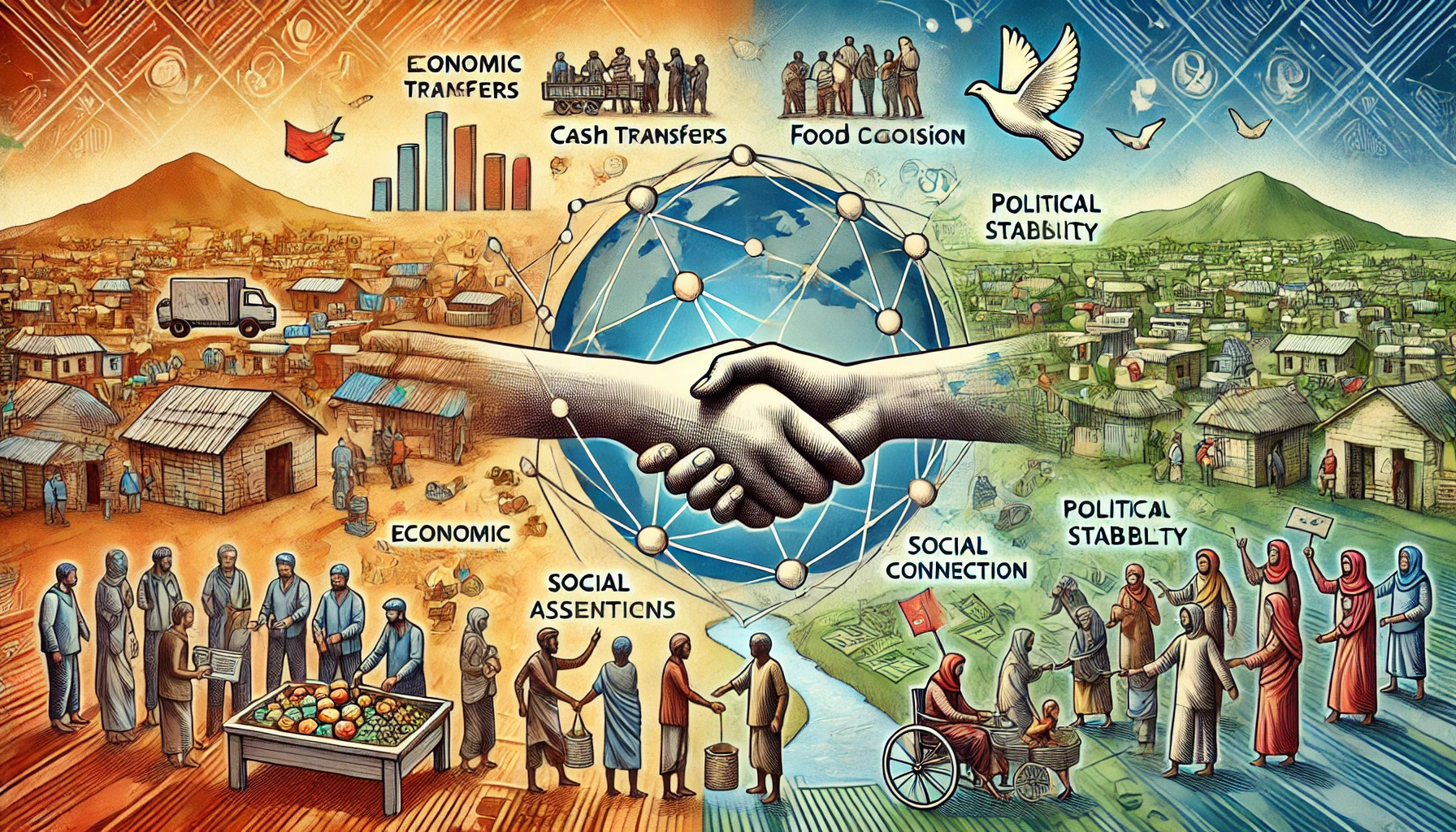Transforming Lives: The Role of Social Safety Nets in Fragile and Conflict Settings
The report explores the transformative role of social safety nets (SSNs) in fragile, conflict-affected, and violent settings, highlighting their potential to alleviate poverty, promote social cohesion, and stabilize political environments. It emphasizes the need for tailored, transparent, and inclusive designs to maximize their impact while addressing implementation challenges.

A report, developed under the guidance of the World Bank's Sahel Adaptive Social Protection Program, with input from leading research institutes such as the International Food Policy Research Institute (IFPRI) and the Overseas Development Institute (ODI), explores the vital role of social safety nets (SSNs) in fragile, conflict-affected, and violent (FCV) settings. These programs are examined as policy tools aimed at addressing economic hardship, fostering social cohesion, and promoting political stability in vulnerable regions. Despite their growing presence in FCV contexts, gaps remain in understanding their full potential and the complexities of their implementation. This document synthesizes over a decade of global research to evaluate how SSNs can mitigate the socioeconomic consequences of fragility and conflict, emphasizing their transformative potential and associated challenges.
Economic Relief and Pathways to Resilience
Social safety nets have proven their value as instruments of economic stabilization and resilience-building. Conditional and unconditional cash transfers, a cornerstone of SSN programs, have consistently reduced poverty, enhanced food security, and improved access to essential services like healthcare and education. These programs empower households by increasing purchasing power, enabling investments in children’s education, health, and long-term productivity. For example, cash transfers in Yemen improved food consumption and school attendance, even during heightened conflict. Similarly, studies in Burkina Faso and Niger show how such programs reduce immediate vulnerabilities while paving the way for human capital development. However, logistical hurdles in conflict zones and risks of aid diversion pose significant challenges. Meanwhile, in-kind transfers such as food assistance provide critical support during crises, particularly in mitigating food price volatility and famine risks. Yet, high delivery costs and inefficiencies remain barriers to their effectiveness, underscoring the need for more adaptive and innovative approaches.
Strengthening Social Cohesion Amidst Fragility
One of the most profound impacts of SSNs lies in their ability to rebuild fractured social fabrics in FCV settings. Programs that combine economic support with community-based psychosocial interventions foster trust and cooperation among diverse groups. For example, integrated cash transfer programs in Niger that included community dialogues significantly promoted inclusive identities and reduced intergroup tensions. Labor-intensive public works programs, such as India’s National Rural Employment Guarantee Scheme (NREGS), create opportunities for collective action, offering employment while addressing community infrastructure needs. However, risks of exacerbating social divisions persist, especially when programs are perceived as favoring specific groups. Ensuring fairness, transparency, and inclusivity is essential to mitigate such risks. Evidence also highlights the importance of targeting and communication strategies to avoid alienating non-beneficiaries and maintain community trust.
Political Stabilization Through Economic Empowerment
SSNs have demonstrated significant potential in fostering political stability and reducing conflict in volatile settings. By addressing economic grievances and reducing the allure of insurgent recruitment, SSNs play a critical role in stabilizing governance. In Afghanistan, community-based cash programs helped build trust between local populations and government institutions, enhancing perceptions of legitimacy. Similarly, programs across sub-Saharan Africa have shown reductions in localized violence by offering viable alternatives to insurgency-driven livelihoods. However, SSNs can inadvertently exacerbate tensions if poorly designed. Instances of elite capture or program manipulation have sometimes intensified grievances, while aid delivery in conflict zones has occasionally become a target for insurgent groups. Policymakers must navigate these complexities, ensuring that SSNs are designed with an understanding of the local political landscape and risks.
Charting the Path Forward
The report concludes with actionable recommendations for policymakers and practitioners. It emphasizes the importance of tailoring SSNs to the specific challenges of FCV settings and adopting evidence-based strategies to maximize their impact. This includes leveraging digital tools to improve transparency and reduce corruption, engaging communities in program design and implementation, and adopting flexible approaches to adapt to crises. For instance, programs that integrate economic support with psychosocial interventions have successfully achieved dual objectives of immediate relief and long-term resilience. Policymakers are also encouraged to prioritize fairness and inclusivity in program design, ensuring that SSNs foster cohesion rather than division.
The review highlights the critical role of social safety nets in addressing the intersecting challenges of poverty, conflict, and fragility. While their impacts are varied and their implementation fraught with obstacles, SSNs remain indispensable tools in mitigating the socioeconomic consequences of FCV settings. By fostering economic stability, promoting social cohesion, and enhancing political resilience, these programs hold the potential to transform millions of lives. As the global community continues to invest in research and refine program designs, the transformative power of SSNs can be harnessed to build more equitable, inclusive, and stable societies. This report's findings are a testament to the potential of SSNs and a call to action for governments, international organizations, and researchers to unlock their full potential in addressing some of the world’s most pressing challenges.
- FIRST PUBLISHED IN:
- Devdiscourse










